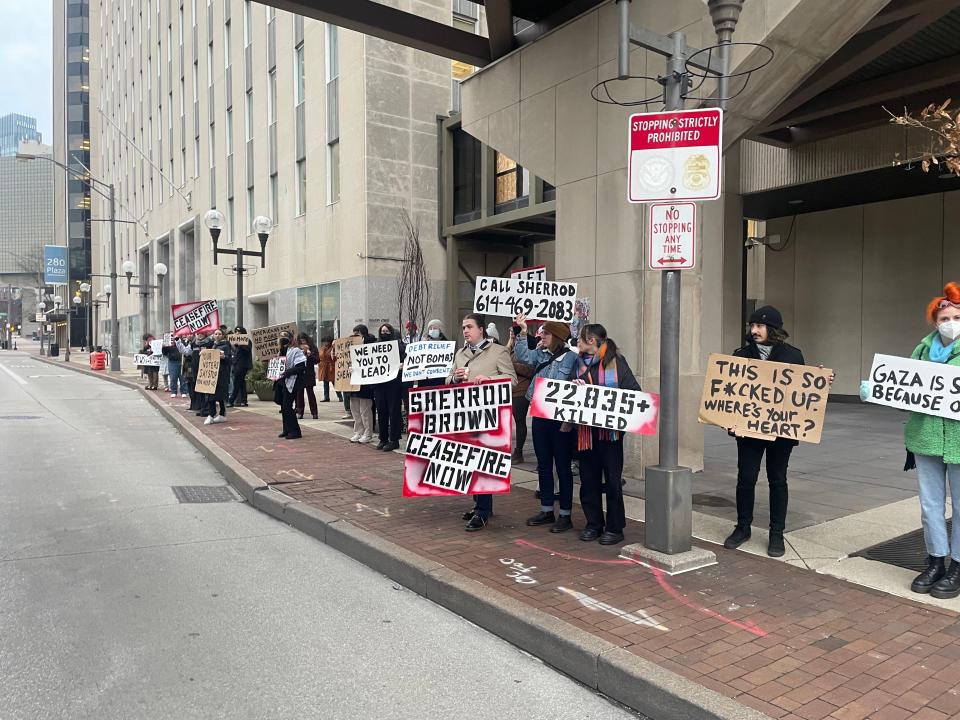Columbus Palestinian Americans paying thousands to evacuate loved ones from war-torn Gaza

Palestinians Americans in Greater Columbus say they are trying to evacuate loved ones from war-torn Gaza by paying Egyptian officials tens of thousands of dollars to ensure their safe passage into Egypt.
Mahmoud Algharabli, a Palestinian American pharmaceutical researcher who lives in Dublin, said he ran out of other options after U.S. State Department officials were unable to help him evacuate his mother and 15 other relatives. Last month, he started a crowdfunding campaign to pay Egyptian officials for evacuating his family members, who are not U.S. citizens.
Algharabli said he went to Egypt in December to try to help his family, where he learned about the possibility of making what he called “under-the-table” payments.
“You pay a fee to evacuate your family from being killed. It's working on the ground. … Everyone knows about it, but (the Egyptian officials) are working in the dark,” he told The Dispatch.
Rosan Eldadah, an Upper Arlington-based real estate agent, also started a crowdfunding campaign to evacuate 40 of her Palestinian family members from Gaza.
Algharabli and Eldadah said that Egyptian officials ask for payments of between $5,000 and $10,000 per person to ensure individuals’ names will appear on official evacuation lists after undergoing security screening.
The Guardian has also documented Palestinian Americans elsewhere paying Egyptian officials to ensure safe passage of relatives.
Egypt has publicly resisted opening the border to most Palestinians, fearing a rush of refugees into the Sinai Peninsula that borders Gaza. The Egyptian Embassy in Washington did not respond to The Dispatch’s request for comment about the payments.
The U.S. State Department said in a statement that it prioritizes evacuating U.S. citizens from Gaza, and is also helping evacuate citizens' immediate family members — including parents, spouses and siblings or unmarried children younger than 21.
“We have assisted over 1,300 U.S. citizens, U.S. Lawful Permanent Residents (LPRs), and family members in departing Gaza. We expect these numbers will continue to grow, but due to operational security reasons and given we do not control the Rafah crossing (a city on the southern Gaza border with Egypt), complete and reliable data is difficult to provide,” a State Department spokesperson told The Dispatch.
Rising death toll in Gaza amidst growing hunger
More than 23,000 Palestinians have been killed since Hamas’ attacks on Israel on Oct. 7, according to the United Nations, quoting the Hamas-run Health Ministry. The Oct. 7 attacks by Hamas on Israeli settlements adjacent to northern Gaza killed around 1,140 people, including around 700 civilians and 70 foreigners, according to Israeli government social security data. Around 70% of Palestinians killed have been women and children, according to the health ministry.
Eldadah, the real estate agent, said three consecutive missile attacks Nov. 18 struck her family home in Gaza City, killing two of her uncles (including Rafat Lubbad, a well-known doctor) as well as an aunt and three first cousins — one of whom was just 3 years old.
“Our biggest hope is our ability to rebuild and do everything in our power to get our home back,” Eldadah said, noting the first priority is to ensure relatives’ safety by getting them out of Gaza.
Only 13 out of Gaza’s 36 hospitals are still partially functional, according to the U.N. News Service, and at least 79 journalists and media workers have been killed, according to the Committee to Protect Journalists.
Israel has severely restricted the flow of aid into Gaza, which experts say is contributing to hyperinflation and growing hunger.
“Everyone in Gaza is hungry! Skipping meals is the norm, and each day is a desperate search for sustenance,” the U.N. World Food Program said last week in a post on X platform, formerly known as Twitter.
Algharabli said his 58-year-old mother is living in a tent in Rafah, where the population has ballooned with refugees. He said she ran out of medication for her asthma and high blood pressure weeks ago.
“My family is 100% civilian — we have nothing to do with any Hamas things,” he said.
Crowdfunding a rescue
Algharabli said he has already sent around $12,000 to his family members in Gaza for their survival needs since October. He started the crowdfunding campaign after Egyptian officials said it would cost tens of thousands of dollars more to evacuate his 16 family members from Gaza.
The payments can ensure that individuals’ names appear on an evacuation list, published daily on the Palestinian General Authority for Crossings and Borders’ Facebook page, according to Algharabli.
Algharabli said he has been in semiregular contact with the State Department about evacuating his mother, but department officials have told him there is little they can do.
Meanwhile, his siblings are debating who should be first to leave for safety.
“How you are going to decide — which daughter is going to go to safety first?” he said.
Columbus protesters call for Gaza cease-fire
On Monday afternoon, several dozen people protested in front of the downtown Columbus office of Sen. Sherrod Brown, Ohio's Democratic senator, demanding he call for a cease-fire in Gaza.
Jesse Vogel, a resident of Columbus' North Side and an organizer of the protest, said his grandfather was a Holocaust survivor.
“He’s no longer living, but he's taught me that it’s important to stand up for people who are experiencing state violence — and that we have a responsibility as Jews to stand up and make our voices heard about that,” Vogel said.

Brown has condemned Hamas’ Oct. 7 attacks, and voted last month for more U.S. military aid to Israel. While he has expressed concern about the rising civilian death toll in Gaza, he has stopped short of calling for a cease-fire.
Ohio’s other senator, Republican J.D. Vance, has called for the U.S. to reject Palestinian refugees. Vance has also condemned Hamas, but he and other Republicans in December blocked a bill to provide Israel and Ukraine more military aid, calling for that aid to be tied to tightening immigration policies at home. In an interview last month with CNN, Vance said he would be willing to approve more Israeli military aid on its own, but he opposes funding for Ukraine.
A U.N. cease-fire resolution in December garnered support from all U.N. Security Council members except the United Kingdom (which abstained) and the U.S.
Peter Gill covers immigration, New American communities and religion for the Dispatch in partnership with Report for America. You can support work like his with a tax-deductible donation to Report for America at:bit.ly/3fNsGaZ.
pgill@dispatch.com
Get more political analysis by listening to the Ohio Politics Explained podcast
This article originally appeared on The Columbus Dispatch: Palestinian Ohioans paying thousands of dollars to save relatives

